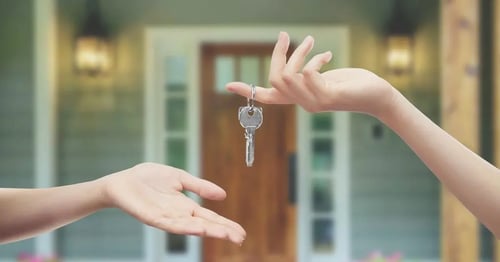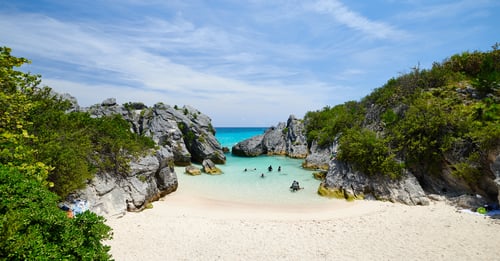Now more than ever, vacation homeowners like you are refining the way they do business by finding new ways to securely and safely rent out their property from a distance. Remotely managing your vacation home and guests is easier than you may think with the help of some good planning and - if you have the budget - technology-based solutions.
Here’s how to rent a vacation home safely and securely.
- Handle Payments Digitally
- Checking In (And Checking Out)
- Update Your Welcome Book
- Control the Climate
- Protect Your Investment - And Your Guests
- Keeping Your Property Clean & Safe
- Check Your Insurance
- Keep In Communication
- Source Local Contractors
1. Handle Payments Digitally
Managing and receiving payment from your guests is among the most important steps in the booking process for both owner and guest.
If you’re doing this yourself, you’ll need to look into software that can manage digital payments seamlessly. It needs to be easy-to-use for guests and also yourself while also being secure to offer peace of mind. Also, look into an accounting app to help manage cashflow if your property isn’t managed by a professional team.
Many platforms where you might choose to advertise your property for rent will have a payment function to keep all of the booking activity within one site. This creates a better user experience and a more streamlined process for your guests. Similarly, if you have gone down the fully-managed route, payment will be handled through them so that's one less thing to worry about.
2. Checking In (And Checking Out)
Your first thought when it comes to remote checking-in may be to install a secure key safe and share the passcode with your guests, allowing them to let themselves into the property on arrival. Although traditional key safes are a tried and tested tool, digital and Bluetooth enabled key safes do exist for an added layer of security.
Alternatively, remove the need for a key safe by installing digital keypad locks that open doors using a chosen number combination. This allows owners to forgo the need for a traditional lock and key so guests don’t need to worry about locking doors at night or forgetting to take a key with them when they leave the property.
Despite its benefits, keep in mind that this is a cost you’ll have to undertake to install in the relevant areas of your property, as well as any potential maintenance costs if there are any potential issues with the technology. On the other hand, a fully-managed option, such as a condo as part of a rental program, ensures any issues like these are maintained by the company managing your vacation property.
3. Update Your Welcome Book
A comprehensive guest book is a must for rental properties. The key to a helpful and robust welcome guide is to include more than just information about the property itself. In among important details such as WiFi codes after you’ve installed a fast and reliable connection, times to expect a cleaner or pool maintenance worker visit and emergency contact numbers, add in other essential but often overlooked details.
Be sure to include other information too, such as places to eat, transport numbers and any local activities such as watersports, animal experiences, tours and shopping markets.
It may be wise to offer a digital guest book, instead of a printed version. This means your guests will always have the most up-to-date information on their mobile devices. It also saves paper and electricity, giving your property an eco-friendly selling point to potential guests.
However, if you’re managing your property yourself, this does mean you’ll always need to know the latest regulations of the country your vacation home is in along with keeping your welcome book updated at all times.
4. Control the Climate
Your guests could walk into an already lit, perfectly cooled or heated vacation home should you choose to use an automated home system. Remotely control the lighting and smart thermostat from anywhere in the world with a system of smart home devices.
As smart home automation allows you to control your home’s climate from afar, you can rest assured that your lighting and heating or AC aren’t left on for long periods of time after your renters check out of the property. This is important as it will reduce the carbon footprint of the property and save you money otherwise needlessly spent on lighting and heating an empty home.
If through colder months, your property is likely to stay empty for periods of time, being able to heat the building will reduce condensation and help prevent dampness from setting in. Also, being able to turn lights on and off remotely during the evenings in an empty property can make it look inhabited, even when it isn’t. By managing this yourself, it’s also another cost to consider both initially and for potential maintenance - even when it's empty.
This is where a property as part of a rental program can be a more convenient and effective alternative. It means those managing your vacation home will ensure your property isn’t empty for too long, achieve a better annual occupancy and also a higher nightly room rate.
5. Protect Your Investment - And Your Guests
CCTV is an excellent way of keeping one eye on your property and your guests. Not only does this protect you in the instance of unruly guests but it will also allow your guests to sleep more soundly and feel protected. Of course, you need to make the presence of CCTV very clear to your guests before their stay.
There are many options when it comes to cloud-based indoor and outdoor CCTV, which allows you to monitor your property through any of your devices connected to the internet. While the appeal of indoor cameras is understandable, external cameras are more important in keeping an eye on the safety of the property.
Again, managing your vacation home yourself means you’re responsible for the security, whereas a fully-managed program means everyone can sleep peacefully at night without worrying about security.
6. Keeping Your Property Clean & Safe
Be sure to hire a good, trusted cleaning service to maintain a clean, healthy and presentable vacation home for renters. If this is something you’re coordinating yourself, look into reviews and see if there’s an online community or vacation home renters near your property to get advice on their experience with cleaning companies you’re considering.
This also means looking into how you'll source spare towels, spare pillows and other amenities that can really elevate a guest’s stay. Providing good quality ‘added extras’ such as these as standard will result in better reviews for your property on websites you advertise on and allow you to charge a little bit more.
If you’re using a well-respected property management company, this is something they will arrange and oversee, so that’s another task off your plate.
8. Check Your Insurance
Make sure your insurance is up-to-date and is the highest coverage your property can afford. A robust insurance plan gives you plenty of fallback cushioning in unprecedented and unpredictable times such as these, so it’s important for your peace of mind as a vacation homeowner renting out your property.
9. Keep In Communication
In the unlikely case that anything should happen during a guest’s stay, such as an accident or an emergency, it’s vital you can easily reach your guests and be reached by them. Your welcome pack and any prior communications about the renting of your property should make it clear how you’ll contact them if needed and how they can contact you in turn.
Again, a property management firm will likely handle this for you. In which case, you should have a number or platform that you'll always be reachable on if there’s an issue they need to make you aware of regarding your property or guests.
10. Source Local Contractors
Should you need to repair or update things at your vacation home remotely, a list of trustworthy local contractors is key to have to hand. Similar to sourcing a trustworthy cleaning company, see if you can use online resources, such as vacation property owner discussion sites to find reliable contractors that fit your needs.
These contractors could include anyone you hire to fit your CCTV, home automation systems, digital keypad locks, key safe or other upgrades you may be making to your second property already to make remote renting easier for you and your guests.
As a start to your essential contractor list, we’d suggest you include the following trades:
- Electrician
- Plumber
- Landscaper, depending on if your property has any outdoor space
- Handyperson for general fixes and touch-ups.
This may seem like a lot of work, but all of this extra time and expense means you may be able to rent out your property for more money, balancing out your costs steadily.
If taking all of these steps to create a safe and secure way of renting out your vacation home seems like it will cost more effort or money than you would like to spend, there are options and resources available.
If you're in the market for a vacation home to rent and use personally, or you’re looking to sell your existing second property and want a vacation home that’s much easier to run, then a fully-managed rental program may be the best route for you in the form on a condo.
An Effortless Renting Solution
Buying overseas property presents an exciting world of opportunity but it’s also a world of risk if you’re unsure of the process. Don’t worry, we’ve got just the guide. We’ve put together a resource that will help you get better acquainted with condo buying laws and guide you through the buying process.
Download it below today for free.






